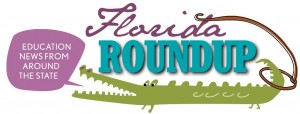 Construction funds: Gov. Rick Scott and the Cabinet approve issuing up to $233 million in education construction bonds. Now legislators have to reconcile their differences on the amount they'll commit to the Public Education Capital Outlay (PECO) program. The Senate bill uses bonding and calls for $617 million for PECO, including $75 million each for public and charter schools. The House bill does not use bonding and allocates lower overall PECO spending, including $100 million for charter schools and $20 million for public schools. News Service of Florida. The Volusia County School Board considers ways to catch up on deferred school maintenance. District officials say many of the problems that have been temporarily fixed over the past 10 years now need a permanent solution, but they're not sure they'll have the money needed. Daytona Beach News-Journal.
Construction funds: Gov. Rick Scott and the Cabinet approve issuing up to $233 million in education construction bonds. Now legislators have to reconcile their differences on the amount they'll commit to the Public Education Capital Outlay (PECO) program. The Senate bill uses bonding and calls for $617 million for PECO, including $75 million each for public and charter schools. The House bill does not use bonding and allocates lower overall PECO spending, including $100 million for charter schools and $20 million for public schools. News Service of Florida. The Volusia County School Board considers ways to catch up on deferred school maintenance. District officials say many of the problems that have been temporarily fixed over the past 10 years now need a permanent solution, but they're not sure they'll have the money needed. Daytona Beach News-Journal.
Title I spending: An amendment recently added to a bill that revises charter schools regulations would limit the amount of Title I funding school districts can spend on administrative overhead and required services for specific groups of students. Rep. Manny Diaz, R-Hialeah, says the change aligns the bill with others that push more authority to school principals and away from centralized administrations. “We need to figure out how to get those dollars down to the school site, where the student is,” he said. redefinED.
Vouchers' hidden costs: Many parents who accept state vouchers to help their special-needs children attend private schools are unaware that by doing so, they lose lose some or most of the protections of the federal Individuals with Disabilities Education Act (IDEA). One of them, Tamiko Walker of Port St. Lucie County, whose son has a speech and language disability, found this out after accepting money from Florida's McKay scholarship, the largest of 10 disability scholarship programs in the United States. “Once you take those McKay funds and you go to a private school, you’re no longer covered under IDEA — and I don’t understand why,” Walker said. New York Times.
ELL success story: English language learners (ELL) at High Point Elementary School are bucking the national trends by equaling or surpassing their peers at other struggling schools in Pinellas County on tests that are considered predictors of how students will perform on the Florida Standards Assessments. ELL students make up about a third of High Point's enrollment, and about 80 percent of them are Hispanic. "They're defying some national trends, which is pretty exciting," said Joyce Nutta, a world languages professor at the University of Central Florida who has been developing teacher training methods at High Point. Tampa Bay Times. (more…)